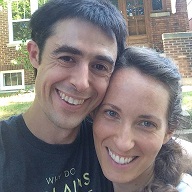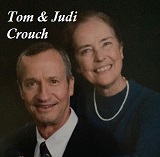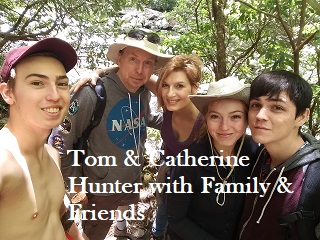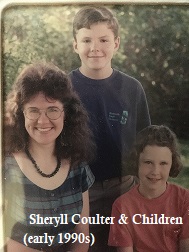Ever wonder on a Sunday morning at First Unitarian Church of St. Louis, during the service or in Fellowship Hall afterward, what spurred the people smiling at you to pick up a pen and sign the Membership Book?
It’s no secret why. They found a community that challenges them to grow, a loving community that supports them through life's challenges and along their unique path forward. Our theology is about creating community, and there's no community without commitment. They understand that their membership sprouts from the need for community. One thing’s for sure: no Unitarian Universalist comes because of fear or fear of sinning.
In the following stories listen to personal voices exemplifying why persons who once may have said to family and friends “I go to First Unitarian Church of St. Louis” now as members say, “my church is First Unitarian.” Curious to know more? - Ask the members in Fellowship Hall.

Anne and Daniel Truran
We moved to St. Louis from Austin, Texas, in 2015, and a few years in found ourselves hungry for community. We found St. Louis a somewhat difficult place to break into socially, and most of our social network was either through work, leading to lots of work talk during social time, or our friends moved away in a year or so. We were also beginning to think of starting a family and wanted a spiritual home for ourselves and the little one. Thus, we began looking for places of worship online.
Anne was in fact raised in the Unitarian Universalist faith community through about the age of eleven, and Daniel was raised in an interfaith Jewish/Eastern spirituality household. This mix meant that we wanted to find a spiritual home where we both felt comfortable, included, and fulfilled. We found First Unitarian Church of St. Louis online and decided to give it a try. Our first Sunday was lay-led, meaning a member of the congregation rather than the minister was giving the service, but it was so well done we didn’t realize she wasn’t the minister. So we came back again for a second Sunday, this time led by the minister. The topic was “How Jewish and Christian are we?” which was a great early entry point for us specifically.
We just kept on enjoying our experiences with worship in the chapel, which kept us coming back. Additionally, as introverts, the idea of coffee hour after the service was always a bit intimidating in the beginning, but we pushed ourselves to go and it very quickly became equally important to our weekly rejuvenation as the services themselves. We found ourselves meeting people from interesting and different backgrounds, who welcomed us into the church and quickly gave us the sense of community and belonging we had been looking for. Daniel began playing music for services at times -- including some of his original songs. This is possibly the only church we know of that would welcome and encourage original music as opposed to the traditional slate of songs. Anne became a Worship Assistant, meaning she assists the minister during services by reading or doing other things as needed every few weeks. Now nearly two years later we have a baby on the way, and find ourselves grateful for the love and support from the First U community!

Tom and Judi Crouch
Judi and I have been members of First Unitarian Church for a little more than two years. We could be called "cultural Christians," having grown up in families with Methodist and Roman Catholic backgrounds, over several generations.
Starting in the late 1980s and gradually culminating in the decade following the events of 9/11, we both felt increasingly isolated from the "Christianity" seemingly being subscribed to by most Americans. This "new" interpretation of Christianity probably reflected the larger societal and world-wide trends of that time. Orthodox fundamentalism was increasing not only in Islam, but also Judaism and Christianity. The combativeness towards dissenters to this orthodox interpretation played out int he nightly TV news headlines. Equally dismaying were the apparently popular ideas among American "Christians" that evolution, global warming, and other well-documented scientific studies were false. The line of thinking proposed seemed to be that the Bible could be interpreted in a literal fashion, explaining everything about our past, present and future. The beliefs of this "fundamentalist" variety of Christianity had permeated the "political right," and had become a divisive instead of unifying force in our national life. Some of the theological trends even seemed to be gaining influence in formerly "mainline Protestant" denominations, such as the United Methodist Church. Under the guise of reversing declining membership, some churches were adopting different worship styles and more literal interpretation of the Bible. It was our perception, too, that our own, local Methodist church, were we had been members for over 30 years, was growing more conservative, theologically.
The larger, societal events described above had made us more skeptical of Christianity, and religion in general. This growing personal skepticism on our parts was especially strong during the Easter season. When our minister declared, several years ago on Easter Sunday, that only those believing in Jesus' physical resurrection were "Christians," our eyes were opened. This statement conflicted with our own interpretation, over the years, that much of scripture was allegorical, and not to be taken literally. Weekly recitation of the Apostles Creed also made us uncomfortable, and helped us realize that we were no longer suited to the religion that we had been a part of for so many years.
During this time of questioning and search, I noticed an article in the "New York Times" about the death of Rev. Forrest Church of All Souls Unitarian Church in New York. It described his life and beliefs, and I was amazed that his ideas and the beliefs of Unitarianism addressed many of the ideological frustrations we had recently been encountering.
On our way to a Sunday worship service, about three years ago, we impulsively decided to give First Unitarian a try. Interim minister, Sam Schaal had an understated, low-key, cerebral approach to the service, and everything we read, said or did was meaningful! We were delighted by the thrilling organ music, the beautiful songs of the choir, the readings from diverse philosophical and theological sources, and the equally moving and relevant words of the hymns. Instead of a creed, there as a statement of shared ideals. The sermon was well thought-out and articulated. The whole experience felt genuine to us and promoted harmony and brotherhood among all people and the world's religions, focusing on common ideals. It seemed consistent with the teachings of Jesus and other learned religious leaders of the past. We loved the inclusive view of humanity as only one component of a very diverse natural world, and the respect for scientific knowledge.
In short, we felt a renewed sense of excitement, and look forward to each week's church service. We enjoy our involvement in the Partner Church Committee, adult Sunday School, UU Essentials filmgoers, choir, and the Women's Alliance, and feel like a part of the church community. The library has proven to be a treasure trove of insightful books helping my continuing search for my own "spiritual truth." We are so grateful for Unitarian Universalism, and First Unitarian Church!
Norma Vogelweid
An autumn Sunday morning in 2003. There is a lightness within me as I push out the glass front door of the First Unitarian Church of St. Louis for the first time and take the few strides across its courtyard to reach the sidewalk. Exactly there, when my body swings right to start the three-block walk home, the genesis of the lightness pops into consciousness: Nothing seriously irritated me in the worship service, nothing.
This is a first in my life—not carrying serious irritation exiting a church on Sunday morning. From young adulthood in many American cities and then over twenty-five years living in Brazil, Switzerland, and Portugal, I have been a taster of services. Sitting in a pew on Sunday morning is a refreshing routine rooted in me. What I seek is time and space to be still with myself in a communal, spiritual place. Due to childhood familiarity that meant a Christian service, despite my maturing sensitivity to a felt ritualization of sinfulness, patriarchy, and infantilization in worship. Spiritual acid reflex routinely hit in the pew. Thus, this autumn morning leaving the service at First Unitarian Church of St. Louis with an unsullied lightness is quite something. I go back the next Sunday, becoming a regular worshiper.
At First Unitarian I discover more than a space to be still; non-judgmental fellowship is given. A few years later, feeling relaxed and glancing around the sanctuary as music starts, I ask myself whether I look like I fit in. Smiling I know that no matter how dissimilar we look no one here would be secretly sad because salvation after death isn’t a worry of mine. And, no one would deride me as puerile because missing Sunday service puts a hole in my week. Sign the Membership Book, Norma. Accept the responsibilities that come with having a home. That week, on March 24, 2009, my signature commits me to a congregation—for the first time in my entire life.
Living is a work of art. My vow while on Earth is to be present to all of life. Belonging to First Unitarian has turned out to be a reassuring and frustrating and wacky contributor to my collage. It adds tons of vibrant yet messy elements because membership has brought me into covenant with a religious community.
My spiritual wellspring is a meditative way of being that includes keeping company with Zen Buddhist koans. Here’s one:
A pilgrim was asked what does Dongshan (8th century China) teach.
“He usually teaches in three ways.”
“What are they?”
“The dark way, the bird path, and the open hand.”

Catherine and Tom Hunter
Tom and I found the First Unitarian Church deliberately and happily shortly after we got married and he was in law school at Washington University. We wanted a welcoming and affirming church that considered everyone valued and inherently worthy. We found a religious home and we found welcome and enrichment there—Tom also loved the doughnuts. The sermons, choir, and music were nourishing, thought provoking and almost always on the mark. We also found lifelong friends, a place to raise our children, and a place of comfort and kindness.
Our children, now adults, have thanked us for going to First U even when they were teenagers. Tom and I particularly value the opportunity for them to participate in the Religious Education program at every age and especially as teens. In eighth grade they had a mentor who supported them in hashing out their ‘Affirmation Statement' of their beliefs, which they read out loud from the chancel to a receptive congregation in the sanctuary. It is always a highlight of the church year to hear the bright, poetic, poignant, and sometimes entertaining statements that the eighth graders share. Additionally, the O.W.L. (Our Whole Lives) Program—a year-long, carefully led exploration of what they might value in life and in relationships—was an excellent preparation for their teen and adult lives. My son loved the youth Cons. Like Tom and I, our children also have lifelong friends because of First U.
Our sense of community here includes our family, friends and this church. We are grateful for so much: the sweetness of the childcare; the experiences of R.E., of Christmas Pageants, the Un-Fish Fry; the amazing generosity of people who serve; the tender support when needed; the excellent people who work at our church; the dear friends; the kindness toward our children; the opportunity to nurture and enjoy the children of the congregation; the shared meals; the garden; our truly gifted and kind minister; the choir and musicians; and everyone in this community. Thank you, the whole is greater than the sum of our parts. We are better because of all of you.

Sheryll Coulter
My children and I moved from Tuscaloosa, Alabama to Webster Groves in August of 1993. Before moving, someone in my yoga group gave me a St. Louis list. It included a recommendation for a yoga studio, a Zen center, a place for the kids to continue cello lessons, and the name of both St. Louis Unitarian churches with a note that I would likely prefer Eliot but try them both.
I had been attending a Unitarian fellowship where most all services were lay-led. I didn’t know choosing a church in St. Louis might be best done after Labor Day, so we visited Eliot right away. Dick Haynes preached. I liked it. We tried First U the next Sunday. I don’t remember who led the service in the old children’s chapel. It was fine but I liked Eliot better. However, when we got in the car and I queried the kids, they enthusiastically endorsed First, so that’s where we began attending and I signed the book at the Hanging of the Greens.
Later when Dick Haynes was interning at our church, he asked my kids why they liked First best, something I had never done. They answered, “Because this church has donuts.” Turns out Eliot has donuts but whoever was responsible forgot to pick them up the morning we attended.
There’s possibly a lesson in there somewhere but all I know is that First Church was a great decision for all three of us. After my kids left for college, I reduced my participation greatly to sit more regularly at the Zen center recommended on that early list. I eventually moved to a Zen group that meets on Saturday and am back as a regular First U member, but I almost never have a donut.

